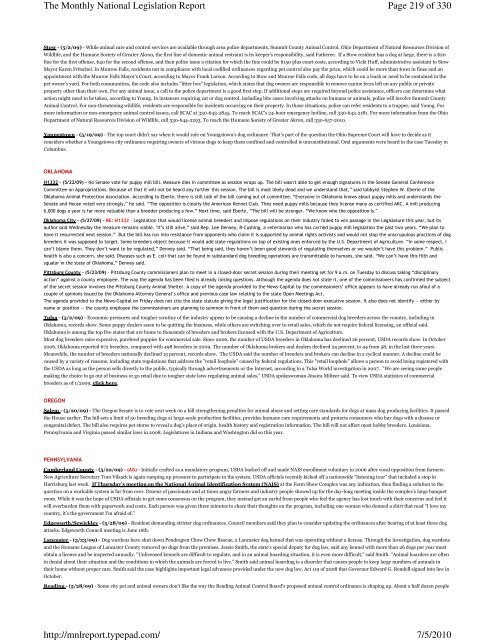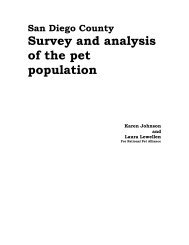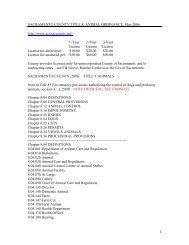Page 1 of 330 The Monthly National Legislation Report 7/5/2010 ...
Page 1 of 330 The Monthly National Legislation Report 7/5/2010 ...
Page 1 of 330 The Monthly National Legislation Report 7/5/2010 ...
You also want an ePaper? Increase the reach of your titles
YUMPU automatically turns print PDFs into web optimized ePapers that Google loves.
<strong>The</strong> <strong>Monthly</strong> <strong>National</strong> <strong>Legislation</strong> <strong>Report</strong>http://mnlreport.typepad.com/<strong>Page</strong> 219 <strong>of</strong> <strong>330</strong>7/5/<strong>2010</strong>Stow - (5/2/09) - While animal care and control services are available through area police departments, Summit County Animal Control, Ohio Department <strong>of</strong> Natural Resources Division <strong>of</strong>Wildlife, and the Humane Society <strong>of</strong> Greater Akron, the first line <strong>of</strong> domestic animal restraint is its keeper's responsibility, said Fatheree. If a Stow resident has a dog at large, there is a $20fine for the first <strong>of</strong>fense, $40 for the second <strong>of</strong>fense, and then police issue a citation for which the fine could be $150 plus court costs, according to Vicki Huff, administrative assistant to StowMayor Karen Fritschel. In Munroe Falls, residents not in compliance with local codified ordinances regarding pet control also pay the price, which could be more than $100 in fines and anappointment with the Munroe Falls Mayor's Court, according to Mayor Frank Larson. According to Stow and Munroe Falls code, all dogs have to be on a leash or need to be contained in thepet owner's yard. For both communities, the code also includes "litter box" legislation, which states that dog owners are responsible to remove canine feces left on any public or privateproperty other than their own. For any animal issue, a call to the police department is a good first step. If additional steps are required beyond police assistance, <strong>of</strong>ficers can determine whataction might need to be taken, according to Young. In instances requiring cat or dog control, including bite cases involving attacks on humans or animals, police will involve Summit CountyAnimal Control. For non-threatening wildlife, residents are responsible for incidents occurring on their property. In those situations, police can refer residents to a trapper, said Young. Formore information or non-emergency animal control issues, call SCAC at <strong>330</strong>-643-2845. To reach SCAC's 24-hour emergency hotline, call <strong>330</strong>-643-2181. For more information from the OhioDepartment <strong>of</strong> Natural Resources Division <strong>of</strong> Wildlife, call <strong>330</strong>-644-2293. To reach the Humane Society <strong>of</strong> Greater Akron, call <strong>330</strong>-657-<strong>2010</strong>.Youngstown - (5/19/09) - <strong>The</strong> top court didn’t say when it would rule on Youngstown’s dog ordinance. That’s part <strong>of</strong> the question the Ohio Supreme Court will have to decide as itconsiders whether a Youngstown city ordinance requiring owners <strong>of</strong> vicious dogs to keep them confined and controlled is unconstitutional. Oral arguments were heard in the case Tuesday inColumbus.OKLAHOMAH1332 - (5/22/09) - No Senate vote for puppy mill bill. Measure dies in committee as session wraps up. <strong>The</strong> bill wasn't able to get enough signatures in the Senate General ConferenceCommittee on Appropriations. Because <strong>of</strong> that it will not be heard any further this session. <strong>The</strong> bill is most likely dead and we understand that,” said lobbyist Stephen W. Eberle <strong>of</strong> theOklahoma Animal Protection Association. According to Eberle, there is still talk <strong>of</strong> the bill coming out <strong>of</strong> committee. “Everyone in Oklahoma knows about puppy mills and understands theSenate and House voted very strongly,” he said. “<strong>The</strong> opposition is clearly the American Kennel Club. <strong>The</strong>y need puppy mills because they license many as certified AKC. A mill producing6,000 dogs a year is far more valuable than a breeder producing a few.” Next time, said Eberle, “<strong>The</strong> bill will be stronger. “We know who the opposition is."Oklahoma City - (5/27/09) - RE: H1332 - <strong>Legislation</strong> that would license animal breeders and impose regulations on their industry failed to win passage in the Legislature this year, but itsauthor said Wednesday the measure remains viable. "It’s still alive,” said Rep. Lee Denney, R-Cushing, a veterinarian who has carried puppy mill legislation the past two years. “We plan tohave it resurrected next session.” But the bill has run into resistance from opponents who claim it is supported by animal rights activists and would not stop the unscrupulous practices <strong>of</strong> dogbreeders it was supposed to target. Some breeders object because it would add state regulations on top <strong>of</strong> existing ones enforced by the U.S. Department <strong>of</strong> Agriculture. “In some respect, Ican’t blame them. <strong>The</strong>y don’t want to be regulated,” Denney said. “That being said, they haven’t been good stewards <strong>of</strong> regulating themselves or we wouldn’t have this problem.” Publichealth is also a concern, she said. Diseases such as E. coli that can be found in substandard dog breeding operations are transmittable to humans, she said. “We can’t have this filth andsqualor in the state <strong>of</strong> Oklahoma,” Denney said.Pittsburg County - (5/23/09) - Pittsburg County commissioners plan to meet in a closed-door secret session during their meeting set for 9 a.m. on Tuesday to discuss taking “disciplinaryaction” against a county employee. <strong>The</strong> way the agenda has been filed is already raising questions. Although the agenda does not state it, one <strong>of</strong> the commissioners has confirmed the subject<strong>of</strong> the secret session involves the Pittsburg County Animal Shelter. A copy <strong>of</strong> the agenda provided to the News-Capital by the commissioners’ <strong>of</strong>fice appears to have already run afoul <strong>of</strong> acouple <strong>of</strong> opinions issued by the Oklahoma Attorney General’s <strong>of</strong>fice and previous case law relating to the state Open Meetings Act.<strong>The</strong> agenda provided to the News-Capital on Friday does not cite the state statute giving the legal justification for the closed-door executive session. It also does not identify — either byname or position — the county employee the commissioners are planning to summon in front <strong>of</strong> them and question during the secret session.Tulsa - (5/2/09) - Economic pressures and tougher scrutiny <strong>of</strong> the industry appear to be causing a decline in the number <strong>of</strong> commercial dog breeders across the country, including inOklahoma, records show. Some puppy dealers seem to be quitting the business, while others are switching over to retail sales, which do not require federal licensing, an <strong>of</strong>ficial said.Oklahoma is among the top five states that are home to thousands <strong>of</strong> breeders and brokers licensed with the U.S. Department <strong>of</strong> Agriculture.Most dog breeders raise expensive, purebred puppies for commercial sale. Since 2006, the number <strong>of</strong> USDA breeders in Oklahoma has declined 26 percent, USDA records show. In October2006, Oklahoma reported 672 breeders, compared with 498 breeders in 2009. <strong>The</strong> number <strong>of</strong> Oklahoma brokers and dealers declined 24 percent, to 44 from 58, in the last three years.Meanwhile, the number <strong>of</strong> breeders nationally declined 15 percent, records show. <strong>The</strong> USDA said the number <strong>of</strong> breeders and brokers can decline in a cyclical manner. A decline could becaused by a variety <strong>of</strong> reasons, including state regulations that address the "retail loophole'' caused by federal regulations. This "retail loophole" allows a person to avoid being registered withthe USDA as long as the person sells directly to the public, typically through advertisements or the Internet, according to a Tulsa World investigation in 2007. "We are seeing some peoplemaking the choice to go out <strong>of</strong> business or go retail due to tougher state laws regulating animal sales," USDA spokeswoman Jessica Milteer said. To view USDA statistics <strong>of</strong> commercialbreeders as <strong>of</strong> 1/2009, click here.OREGONSalem - (5/20/09) - <strong>The</strong> Oregon Senate is to vote next week on a bill strengthening penalties for animal abuse and setting care standards for dogs at mass dog producing facilities. It passedthe House earlier. <strong>The</strong> bill sets a limit <strong>of</strong> 50 breeding dogs at large-scale production facilities, provides humane care requirements and protects consumers who buy dogs with a disease orcongenital defect. <strong>The</strong> bill also requires pet stores to reveal a dog's place <strong>of</strong> origin, health history and registration information. <strong>The</strong> bill will not affect most hobby breeders. Louisiana,Pennsylvania and Virginia passed similar laws in 2008. Legislatures in Indiana and Washington did so this year.PENNSYLVANIACumberland County - (5/22/09) - (AG) - Initially crafted as a mandatory program, USDA backed <strong>of</strong>f and made NAIS enrollment voluntary in 2006 after vocal opposition from farmers.New Agriculture Secretary Tom Vilsack is again ramping up pressure to participate in the system. USDA <strong>of</strong>ficials recently kicked <strong>of</strong>f a nationwide “listening tour” that included a stop inHarrisburg last week. If Thursday’s meeting on the <strong>National</strong> Animal Identification System (NAIS) at the Farm Show Complex was any indication, then finding a solution to thequestion on a workable system is far from over. Dozens <strong>of</strong> passionate and at times angry farmers and industry people showed up for the day-long meeting inside the complex’s large banquetroom. While it was the hope <strong>of</strong> USDA <strong>of</strong>ficials to get some consensus on the program, they instead got an earful from people who feel the agency has lost touch with their concerns and feel itwill overburden them with paperwork and costs. Each person was given three minutes to share their thoughts on the program, including one woman who donned a shirt that read “I love mycountry, it’s the government I’m afraid <strong>of</strong>.”Edgeworth/Sewickley - (5/28/09) - Resident demanding stricter dog ordinances. Council members said they plan to consider updating the ordinances after hearing <strong>of</strong> at least three dogattacks. Edgeworth Council meeting is June 16th.Lancaster - (5/23/09) - Dog wardens have shut down Pendragwn Chow Chow Rescue, a Lancaster dog kennel that was operating without a license. Through the investigation, dog wardensand the Humane League <strong>of</strong> Lancaster County removed 90 dogs from the premises. Jessie Smith, the state's special deputy for dog law, said any kennel with more than 26 dogs per year mustobtain a license and be inspected annually. "Unlicensed kennels are difficult to regulate, and in an animal hoarding situation, it is even more difficult," said Smith. "Animal hoarders are <strong>of</strong>tenin denial about their situation and the conditions in which the animals are forced to live." Smith said animal hoarding is a disorder that causes people to keep large numbers <strong>of</strong> animals intheir home without proper care. Smith said the case highlights important legal advances provided under the new dog law, Act 119 <strong>of</strong> 2008 that Governor Edward G. Rendell signed into law inOctober.Reading - (5/28/09) - Some city pet and animal owners don't like the way the Reading Animal Control Board's proposed animal control ordinance is shaping up. About a half dozen people




